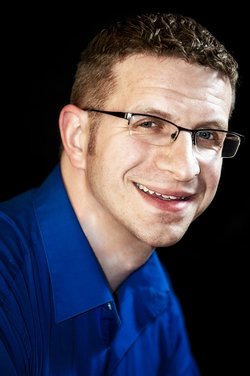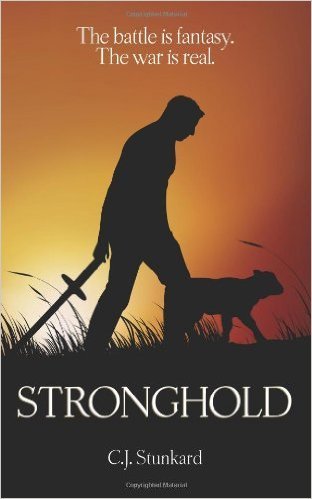Q: Your book Stronghold touches on issues of porn and addiction but you wrote it before all of the recent media attention. How does it feel to have others catching up to where you are on this issue?
A: I'm hopeful. The first step in solving a problem is acknowledging it exists.
Q: What has been your journey with porn?
A: In junior high, I developed the habit of using pornography as a catch-all emotional band-aid to cope with rejection, escape insecurity, and numb any pain, only to have all of those aspects of life compounded by carrying shame over the secretive behavior. Though I wanted to stop, I didn't think change was possible. That's one of the lies that addiction tells you. Over a decade later, I realized that I could not keep pornography in my life and expect to have healthy, intimate relationships. I had to choose one or the other. I've had obstacles on my road, but this April marks six years of living in real freedom wherein I know I neither need porn nor want it.
Q: What made you want to write the book?
A: I love books, and I felt a spiritual leading to write one; that was enough to get started.
Q: Why did you choose to tell the story as fiction?
A: Fiction is powerful. Story shows us the truth beyond telling us about it, and fiction enables us to design narrative to maximize catharsis for our audience. You can tell people about hope or show them The Shawshank Redemption. You can tell them siblings are wonderful or hand them Little Women. You can tell them God walks alongside them or give them Chronicles of Narnia: A Horse and his Boy (or my book, if you wanted). Even arguably bad fiction resonates with us. During the last painful 400 meters of a 5K, I want to quit. My body begs me to stop. But my soul refuses. In my mind I'm hearing Corner Man Duke from Rocky IV, Rocky versus Drago, round 15, and he's screaming, "All your strength, all your power, all your love -- everything you've got! This is your whole life here!" He was coaching Rocky, but on countless runs, he has coached me. That's the power of fiction, and that's what I wanted to create through Stronghold, to give readers something to recall during the throes of temptation, so that they would know, "I can get through this."
Q: How does the story relate to your experiences?
A: In one sense it's autobiographical but, in another, intentionally not. The journey of the protagonist reflects my experience. In the midst of temptation, I've felt both oppression and deliverance. Stronghold is an outpouring of those specific experiences but also covers general concepts surrounding addiction. I tried to design the book so that any male reader could picture himself as the protagonist. I omitted the main character's physical traits -- skin color, eye color, height, and weight. I don't even give his name; he is simply called, "The Believer". Stronghold reflects my emotional and spiritual experiences, but it should resonate with anyone who has struggled with addiction.
Q: Do you feel like your generation was left unsupervised by adults who should have known better?
A: No. I grew up in a home with parents who did not own or watch anything illicit, but I still found plenty of porn outside the house. Growing up, most adults I knew trusted that I would make good choices; I do not blame them for my betrayal of that trust. Individuals are responsible for their actions.
Q: How have you seen porn affect relationships?
A: I've seen it wound them. Porn use tends to be secretive, so it blocks intimacy, creates guilt, and increases shame. And that's not limited to sexual partners. A person using porn illicitly often feels like he will be discovered and rejected at any moment, which leads him to distrust people and keep them at arms' length.
Q: How have you and your friends coped with it?
A: For me, it's spiritual warfare. Human existence is God's telling an eternal narrative of infinite significance. Our purpose here is to love God and love others; porn encourages selfishness and isolation, the opposite of that. My escape from it was a battle out of bondage. Stronghold tells that story. Other men approach it differently. For many, they know porn is exploitative and want no part of it. For some, it's all about competition against their weaker impulses. For others, the approach is psychological; they do not like feeling numb to pain or doing things they wish they would not do, so they want to understand what drives their behavior.
Q: How do you see it affecting sexual performance?
A: Porn transforms sexuality into a quest for pleasure whenever, wherever, however, and however often, the desire hits. Frankly, if sex is all about you getting what you want, then you are probably bad at it. No one enjoys being used, especially in a context as vulnerable as sex. Plus, scientific research is telling us that there is a virility issue, so there's that to consider.
Q: What did your wife say when you first brought up the topic with her?
A: I told my wife about my ongoing struggle with porn use early in our dating relationship. I thought it would be a deal-breaker, but I loved her and did not want to keep secrets. She was gracious and forgiving. We walked into our marriage with the issue in the open, and she has always been patient and supportive in my doing whatever I felt necessary to remove porn use from my life. Today we have a relationship wherein she trusts me, and my choices communicate to her, "you fulfill all of my sexual needs, and I want to do the same for you." Relationships can make it through the revelation of secretive porn use; you can restore love, trust, and intimacy.
Q: Is there a role for government?
A: That's a loaded question that people much smarter than me are still debating, and I would embarrass myself if I went too far into the weeds on it. Government cannot legislate morality; edicts do not change people's hearts. Real social progress results from individuals having the humility to admit error and course correct. Government can facilitate that, not legislate it.
Q: How has your religious faith and upbringing affected your attitudes and how you dealt with things?
A: Being a part of God's spiritual family has been the most important aspect of my surviving addiction. I knew that despite my failure to change, God made me and wanted me to live well. I held on to the hope that I would reach the light at the end of the tunnel if I were faithful to him. In the end, the Lord was the faithful one. When I was kicking and screaming to be given over to my debased desires, Jesus Christ was pulling me toward the light, toward deeper relationships with others and himself.
Q: What solutions do you think could work?
A: Different approaches work for different people. Some guys put monitoring or filtering software on their electronic devices. I know men who left porn use behind them through the support of one or two close confidants who encouraged new and better behaviors. I have seen men overcome their addiction through my work with X3Groups, a small groups program offered by X3Church. Porn use and the behavior that goes with it must be replaced with something else; the needs we are trying to meet will always be there, but we can meet them in a healthy way. Saying "no" to something we want is hard work, but it becomes easier if we are saying, "yes" to something better. Positive reinforcement beats negative reinforcement every day of the week.
Q: What would your advice be to a teenager when it comes to porn?
A: Your life is better without it. You have better outlets to relieve stress. You have better means to address pain. You do not need it, and it will not help you.
Q: Will your next book also be about the topic?
A: Not the next one. Currently, I'm working on a teen romance that serves as a love letter to the evangelical subculture in which I was raised. But I would not be surprised if I wrote about this issue again. I would need to find the right story, and I have a suspicion it would be less internal. It would be a love letter to the people with whom I've walked this journey.


